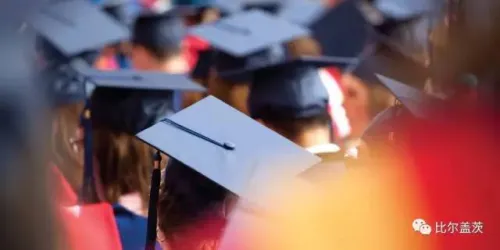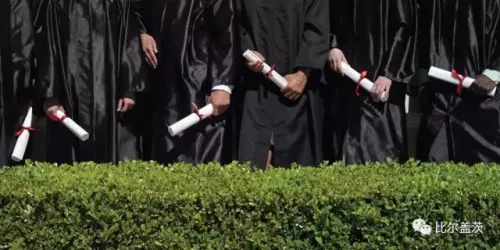6 月 22 日消息,一直致力于慈善事业的世界首富比尔·盖茨,对于青年人的成长怀有饱满的关怀和期待。正值一年一度的毕业季,盖茨对 2017 届的毕业生写了一封长信,在其个人微信公众号上推送。
在信中,盖茨分享了自己的人生功课,包括给出职业方面的建议,告诉大家应当同怎样的人为伍,当然还推荐了一本对其世界观产生影响的书籍。相信每个关心自我成长,关心未来的青年都会花上两分钟时间细读。
以下是盖茨分享的全文:
亲爱的 2017 届毕业生:
祝贺你们!你们刚刚完成了一件我没能做到的事——获得大学文凭。
我敢肯定你们这些天一定听到了很多建议,不论是从毕业典礼演讲者那里,还是从参加你毕业派对的每一个叔叔阿姨那里。冒着被认为重复絮叨的风险,我想我还是应该分享一些自己的想法。
刚毕业的大学生们经常向我寻求职业方面的建议。我很幸运,因为在我二十岁刚出头时,数字革命刚刚开始,这让我和保罗·艾伦(Paul Allen)有机会参与其中并帮助影响它的发展(这也解释了我为什么没有获得大学学位——我之所以离开学校,是因为我们害怕自己与这场革命的发生无关)。假如我今天要重新出发,寻找同样能给世界带来重大影响的机会,我会考虑以下三个领域。
第一是人工智能。我们刚刚开始全方位涉猎这个领域,人工智能会使人们的生活更有效率、更具创造性;第二是能源,因为能够获得清洁、实惠和可靠的能源,是抗击贫困和应对气候变化必不可少的条件;第三是生物科学,这一领域充满了机会,可以帮助人们活得更长久、更健康。

但不管你选择什么样的职业,生命中有些东西都是客观存在的。我多么希望在离开学校时,我已经对这些事情有了更深刻的理解。首先,智力并没有我曾经所想的那样重要,而且智力有许多不同的形式。在微软成立之初,我认为如果你代码写得很棒,那么你也能管理好人员或运营好一个营销团队,再或者做好其他任何一项工作。关于这一点,我曾经的想法是错误的。我必须学会发现并欣赏人们不同的才干。如果你还没能做到的话,你越快地做到这点,你的生活将越丰富。
还有一件事我希望自己能早点明白,那就是真实的不平等长什么样。我直到将近四十岁时才得以亲眼看见不平等,那是在我和梅琳达第一次去非洲的时候。我们因所看的景象而震惊。回国之后,我们便开始进行更多的学习。让我们震惊不已的是,有一些疾病每年能夺取非洲数百万儿童的生命,而生活在富裕国家的人却根本不用为这些疾病担忧。我们认为这是世上最不公正的事。我们意识到我们应立即参与其中——我们必须立即开始回馈社会。
我在你们这个年纪的时候,所知道的东西要比你们现在知道的少得多。科技赋予你们能力,使你们能通过我和我的朋友们从未经历过的方式去看待问题,也能通过我们从未想过的方式去帮助别人。你们可以更早地开始与不平等作斗争,无论是在你所在的社区,还是在地球另一端的某个国家。
与此同时,我鼓励你们与这样一群人为伍:他们挑战你、教导你并推动你成为最好的自己。对我而言,梅琳达就扮演着这样的角色,我也因此得以成为更好的自己。同我们的好朋友沃伦·巴菲特一样,我衡量自己幸福感的方式,是看我最亲密的人是否快乐、是否爱我,以及看我给别人的生活带去了怎样的影响。
如果我能给你们每人一份毕业礼物,这份礼物将是一本由斯蒂芬·平克(Steven Pinker)撰写的《人性中的善良天使》。读了这么些年书之后,你们或许不会很渴望阅读一本七百多页的著作。但请把这本书加入你的阅读列表,等到准备好的时候再来打开它。这是我读过的最有启发性的一本书。
平克非常有力地论证了世界正变得越来越好——我们生活在人类历史中最和平的时代。证明这一点并不容易,尤其在当下这个时候。当你和人们说世界正变得越来越好时,人们看你的眼神就好像在说你不是太天真,就是疯了。
但这是真的。一旦你明白了这一点,你便会开始用不同的方式看待世界。如果你感觉事情正变得越来越好,你就会想知道是什么在起作用,然后你可以加快进步并将它传播给更多的人、更多的地方。
我的意思不是让你无视我们所面临的严峻问题,而是意味着你相信这些问题可以得到解决,以及你要在此信念之下采取行动。
这就是我世界观的核心。它支撑我度过艰难的岁月,也是我在从事了十七年慈善工作后依旧热爱这项事业的原因。我相信它会带给你相同的影响。
衷心祝福你们。我们生活在一个不可思议的时代,我希望你们能把握住这段时光。

Dear Class of 2017,
Congratulations! You’ve just accomplished something I never managed to do—earn a college degree.
Between your commencement speaker and every aunt and uncle at your graduation party, I am sure you are getting a lot of advice. At the risk of piling on, I thought I would share a few thoughts.
New college graduates often ask me for career advice. I was lucky to be in my early 20s when the digital revolution was just getting under way, and Paul Allen and I had the chance to help shape it. (Which explains my lack of a college degree—I left school because we were afraid the revolution would happen without us.) If I were starting out today and looking for the same kind of opportunity to make a big impact in the world, I would consider three fields.
One is artificial intelligence. We have only begun to tap into all the ways it will make people’s lives more productive and creative. The second is energy, because making it clean, affordable, and reliable will be essential for fighting poverty and climate change. The third is the biosciences, which are ripe with opportunities to help people live longer, healthier lives.
But some things in life are true no matter what career you choose. I wish I had understood these things better when I left school. For one thing, intelligence is not quite as important as I thought it was, and it takes many different forms. In the early days of Microsoft, I believed that if you could write great code, you could also manage people well or run a marketing team or take on any other task. I was wrong about that. I had to learn to recognize and appreciate people’s different talents. The sooner you can do this, if you don’t already, the richer your life will be.
Another thing I wish I had understood much earlier is what true inequity looks like. I did not see it up close until my late 30s, when Melinda and I took our first trip to Africa. We were shocked by what we saw. When we came back, we began learning more. It blew our minds that millions of children there were dying from diseases that no one in rich countries even worried about. We thought it was the most unjust thing in the world. We realized we couldn’t wait to get involved—we had to start giving back right away.
You know much more than I did when I was your age. Technology lets you see problems in ways my friends and I never could, and it empowers you to help in ways we never could. You can start fighting inequity sooner, whether it is in your own community or in a country halfway around the world.
Meanwhile, I encourage you to surround yourself with people who challenge you, teach you, and push you to be your best self. Melinda does that for me, and I am a better person for it. Like our good friend Warren Buffett, I measure my happiness by whether people close to me are happy and love me, and by the difference I make in other people’s lives.
If I could give each of you a graduation present, it would be a copy of The Better Angels of Our Nature, by Steven Pinker. After several years of studying, you may not exactly be itching to read a 700-page book. But please put this one on your reading list to get to someday. It is the most inspiring book I have ever read.
Pinker makes a persuasive argument that the world is getting better—that we are living in the most peaceful time in human history. This can be a hard case to make, especially now. When you tell people the world is improving, they often look at you like you’re either naïve or crazy.
But it’s true. And once you understand it, you start to see the world differently. If you think things are getting better, then you want to know what’s working, so you can accelerate the progress and spread it to more people and places.
It doesn’t mean you ignore the serious problems we face. It just means you believe they can be solved, and you’re moved to act on that belief.
This is the core of my worldview. It sustains me in tough times and is the reason I still love my philanthropic work after more than 17 years. I think it can do the same for you.
Good luck to all of you. This is an amazing time to be alive. I hope you make the most of it.
